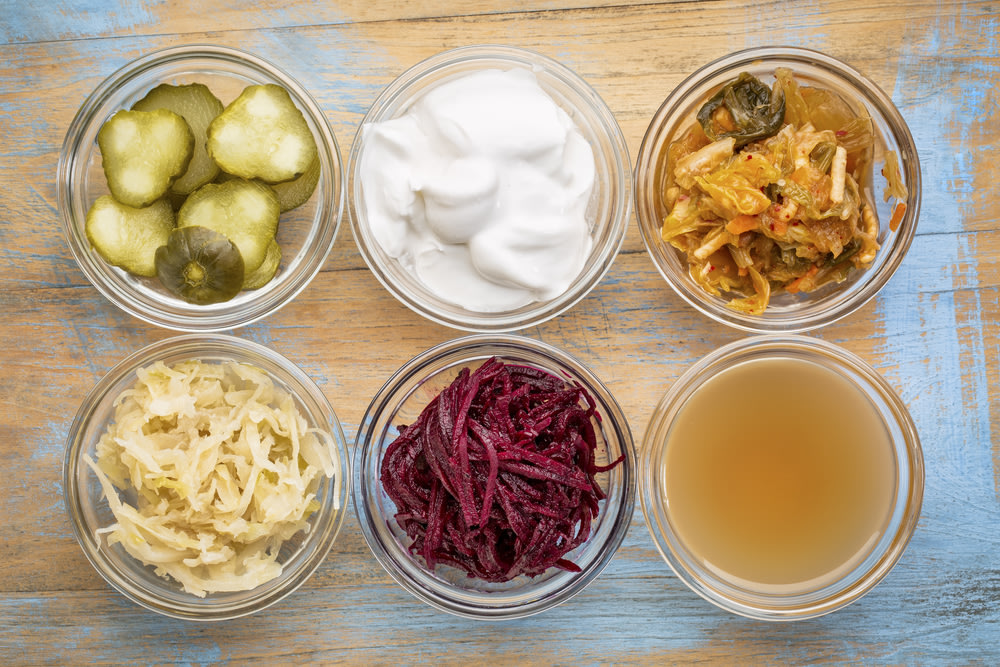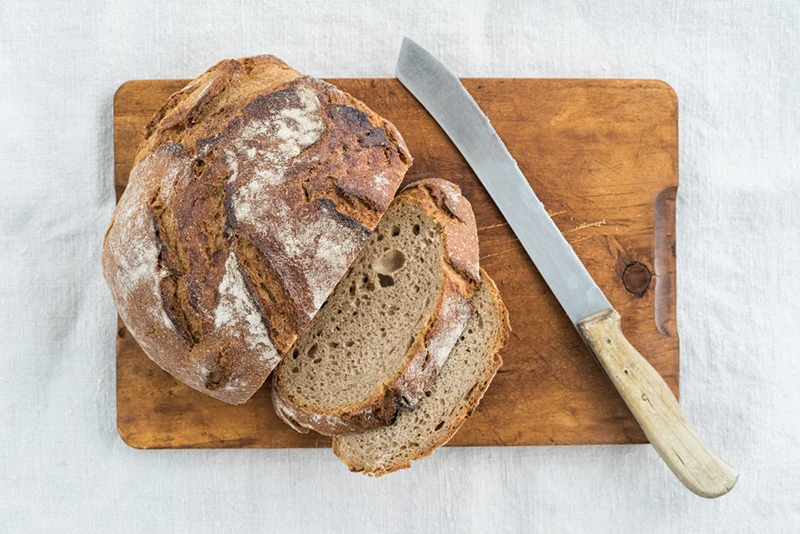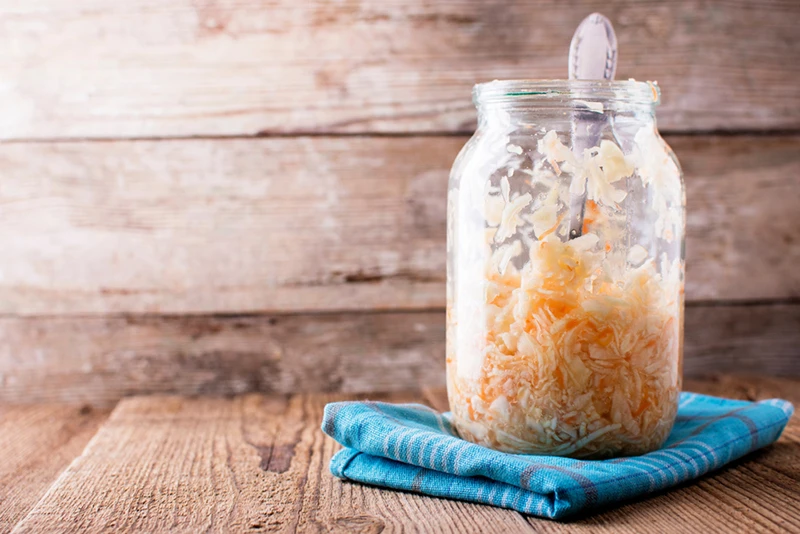Should You Try Fermented Foods?

September 13, 2017

When you hear the word fermented, do you automatically think of something that has gone past its best before date? Yep, I know it sounds a little strange, but fermentation can actually be good for us!
Let me explain what fermented foods are and WHY they have become such a big talking point.
What are fermented foods?
Fermentation describes the process where natural sugars and carbohydrates are converted into lactic acid. Because the natural sugars turn to acid in the fermenting process, the sugar content of the food is reduced. The fermenting stage, also sometimes called culturing, is when microorganisms actually begin to break the foods down. That’s when the flavour begins to change.
The sour or tangy taste you might recognise in fermented foods comes from the lactic acid, which produces digestive enzymes and ‘good’ bacteria. The digestive enzymes in these foods can actually help the gut to better absorb the nutrients in your food. That’s why I named them one of the five superfoods to start eating!
How do fermented foods affect the body?
Fermented foods contain all kinds of healthy bacteria, also known as probiotics. This good bacteria can help to keep a balance in your gut, which can lead to more efficient digestion, along with a bunch of other potential health benefits! Probiotics may help to stabilise blood sugar levels, lead to better immune function, help to reduce bloating, improve the health of your skin and they may help boost the release of serotonin (a natural chemical in the brain that helps us to feel happy).
Your gut is actually the largest part of your immune system, so when it works to the best of its ability, we tend to feel better. Makes sense, right?
Fermented foods you should try
While all of these foods are classified as fermented, most have different strains of probiotics. It’s a good idea to mix it up a little if you can so you can enjoy the benefits of these multiple strains. Below is a fermented foods list you can refer to — some of these fermented foods you may already be familiar with!

Sourdough bread
Sourdough is made from the fermentation of live yeast cultures, water and good bacteria. During the baking process, lactic acid develops and this helps to break down starches and grains — leaving a slightly sour taste to the loaf. The result is a bread that is easier to digest and that helps other nutrients to become more easily absorbed by the body.
Miso
Did you know miso is a fermented paste? It’s made from fermented soybeans and grains AND it is full of essential minerals like potassium. Miso provides a savoury or ‘umami’ taste, making it great as a soup or added to a stir-fry. It also makes for a delicious miso ramen!

Sauerkraut
Possibly the easiest fermented food to make, sauerkraut is made from finely sliced cabbage which has been fermented. Sauerkraut can provide a healthy dose of probiotics and it is also high in fibre — which can both help to boost your digestive health. It is often eaten with cooked meats and cheese.
Kombucha
Made from fermented tea, kombucha has a lot of different ‘good’ bacteria in one drink! Just read the label before you drink it. The fermenting process can sometimes produce very small amounts of alcohol, but some bottles may have a higher alcohol percentage than others. Some also contain added sugars, so skip these ones to enjoy more health benefits.
Tempeh
Made from fermented soybeans, tempeh is made by pressing the soybean together to form a patty. Available in plain or flavoured varieties, tempeh is often used as a meat substitute. It contains all the essential amino acids, so is a complete protein, making it a good protein for vegetarians and vegans.
Natto
Similar to tempeh, natto is also made from fermented soybeans. Unlike tempeh, natto has a sticky texture and it also has a distinct smell. Natto is loaded with probiotics and it is a good source of protein, fibre, iron and calcium.

Kimchi
Kimchi is a staple in Korean cuisine and lots of fermented foods recipe ideas use kimchi for spice. It is similar to sauerkraut as it is made from fermented cabbage, however, it has some extra added vegetables like radish, onion and garlic. It also has a little more spice from the ginger and Gochujaru, a Korean chilli powder. Kimchi is a great spicy option for overall gut health.
Kefir
A yeast fermented milk product, made from cow, goat or sheep’s milk, kefir is often called a drinkable yoghurt! It makes a perfect addition to a smoothie, as it adds bulk. Kefir is a good source of protein, calcium and vitamin D, as well as being packed with probiotics. Because it is made from yeast, avoid this one if you are sensitive to yeast products.
Yoghurt
A tub of yoghurt that says ‘contains live and active cultures’ on the side of it can also be good for your gut! These yoghurt varieties are guaranteed to have 100 million probiotic cultures per gram when manufactured, which is almost as much as some probiotic supplements. Fermented food recipes don’t come any easier than mixing some yoghurt with your favourite topping!
Lassi
You might have heard of a mango lassi — it is really popular as a refreshing drink on a hot day! Made from a combination of yoghurt, milk or water and spices, lassi originates in India. It is made either sweet or savoury, flavoured with fruit and/or spices (such as turmeric). A quick and easy fermented drink, lassi is a source of calcium and probiotics.
Give fermented foods a try!
Aside from being really versatile and tasty, fermented foods can be helpful for the health of your gut.
If you want to improve immune function, help your digestion and get rid of bloating, you could try picking from the fermented foods list and adding a couple of these to your diet.

I’m Kayla Itsines, co-founder and head trainer at Sweat! I’ve been a certified personal trainer since 2008 and am also certified in pregnancy and postnatal exercise. My goal has always been to empower women by giving them the practical tools they need to improve their health and fitness and feel more confident.
* Disclaimer: This blog post is not intended to replace the advice of a medical professional. The above information should not be used to diagnose, treat, or prevent any disease or medical condition. Please consult your doctor before making any changes to your diet, sleep methods, daily activity, or fitness routine. Sweat assumes no responsibility for any personal injury or damage sustained by any recommendations, opinions, or advice given in this article.
Nutrition